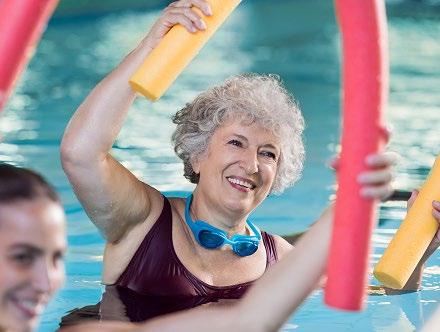
2 minute read
Looking after Yourself
from Carers' Guide
by age_ni
Move More to Feel Good
Staying active is powerful medicine for both mind and body. Regular exercise and movement can help reduce the impact of several diseases, for example osteoporosis, high blood pressure, heart disease and stroke and it can reduce the risk of falls by keeping our muscles strong. Moving our body can also improve sleep and improve low mood and memory.
Advertisement
Mental and Physical Health
It can be difficult to make the time to put yourself first but self-care as a carer is not selfish: it is vital so that you can carry out your caring role and live a fulfilling life too.
It can be easy to forget about “being healthy” when caring responsibilities build up and you have many competing demands on your time. However, physical activity, eating well, rest and relaxation are really important to achieve the balance of care for yourself, whilst caring for someone else.

The idea of starting a new activity, particularly when you already feel under pressure, can be daunting. Start with small steps, aim to establish a routine with the time clearly allocated to it (like a diary appointment), and set yourself some manageable goals in the first instance. Celebrate the little wins and take note of how they make you feel.
Taking regular exercise is one of the best things you can do to keep mentally and physically strong, both to be able to carry out your caring role, and to live a full life for yourself.
The first and most important step to moving more is to break up periods of inactivity throughout the day. If you haven’t been very active, aim to stand more and sit less: you could do this by taking regular walk breaks around the garden or street or doing some gentle stretches while waiting for a kettle to boil when making a cup of tea or coffee.
If you are already active, keep up this activity to boost your energy and improve your mood, helping you to deal with stress and challenges you may face in your caring role.
Some suggestions for moving more:
Aerobic activity should be sufficient to get your heart rate up a little, make you breathe faster and feel warmer. You will need to begin this slowly and build up gradually if you haven’t done anything vigorous for a while.
The Public Health Agency’s guidance is 150 minutes of moderate intensity activity every week.
This may seem overwhelming, but you can build up gradually, and all activity counts, even if it’s only a few minutes at a time, across the day or week.
Be active in a way and at times that suit you. All movement brings benefits.
Examples of aerobic activity:
• Brisk Walking
• Climbing Stairs
• Swimming
Day to day activities which keep your muscles strong include:
• Carrying or moving loads such as groceries.
• Gardening jobs such as mowing the lawn, digging, collecting grass and leaves.
• Activities involving stepping and jumping, such as dancing.
Scan here for the NHS website’s useful 10 minute activity videos
If you experience any of the following when exercising, stop and contact your GP:
• Discomfort in your chest.
• Excessive shortness of breath - you should still be able to hold a conversation whilst exercising.
• Dizziness.
• Excessive pain.







